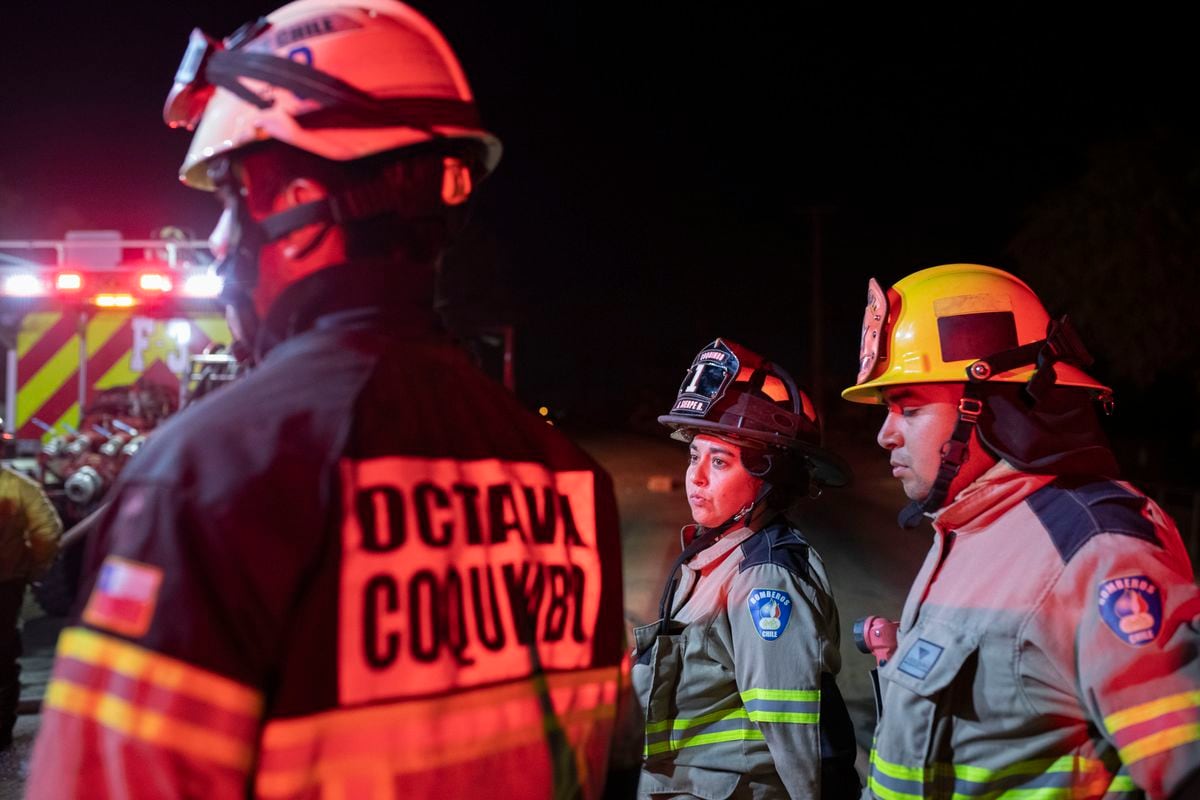Firefighters of Chile is an institution that, like in few countries in the world, has a completely voluntary body.
The almost a thousand men and women who helped these days extinguish the mega fire that claimed 131 lives in the Valparaíso region are not going to receive a single cent.
What's more, they pay to serve.
Each member pays a monthly fee established by their company.
The majority are between 20 and 39 years old and are professionals who dedicate themselves to something else.
When duty calls, they close their computers and rush to assist the community.
By law, they cannot be fired from their jobs for offering their services in an emergency.
The president of the institution, Juan Carlos Field, assures that 98% of firefighters “do not want to be paid.”
Has the issue ever been discussed or voted on in the board?
“Never,” he responds via audio recording.
83% of Chileans want the country's highest-rated institution to abandon the volunteer system and the State to finance the salaries of its 56,670 members (78% men; 22% women), according to the pollster Cadem, the only one that has asked about the payment, in 2017. “It's not that easy,” says Field.
“The country does not have money to finance such a number of firefighters.
And, second, we appreciate it, but we definitely don't want to,” she adds.
What they do want, she emphasizes, is to be compensated with funds for regional projects, construction of barracks, bomb cars or equipment to attack fires.
The system of the oldest firefighting institution in Latin America has been the same since its creation.
In 1851, a group of residents of Valparaíso, about 120 kilometers from Santiago, decided to organize to fight the fires after the flames consumed a cigarette shop in the port: some called for volunteers and others obtained financing to form the first companies.
The successful formula was replicated in other locations.
The economic solvency of its aristocratic members was key to subsistence during the first 100 years.
In the middle of the 20th century, however, fire departments multiplied throughout Chile, adding to their ranks middle-class men who could not spend large amounts.
Since then, they have increasingly depended on external contributions.
Figures of active volunteers on the ground based on data from the Chilean Fire Department.
Thousands of others fulfill various functions.
Firefighters of Chile receive funds from the treasury established in the Budget Law.
For this year, the Government of Gabriel Boric presented a 6% reduction, but they finally agreed to maintain the amount: 57,000 million pesos (59,000 dollars), which represents 60% of the institution's financing.
The remaining percentage comes mainly from municipal funds, and resources from the fire departments themselves or donations from companies and individuals.
It is not unusual to see volunteers walking among cars on the street with a piggy bank on certain dates, collecting money or organizing raffles.
Valparaíso Fire Superintendent Juan Paredes estimates that the costs of the mega fire in the region are around $4.8 million.
“Last year we did a study, based on an emergency drill like the one we experienced this week, and in one day we spent 1.4 million dollars to mobilize the entire system and personnel.
The State has never evaluated the economic contribution we make to Chile,” he says by phone.
“Fuel is charged to us just like any Chilean.
There are smaller fire departments where they cannot go out because they do not have fuel.
That cannot be,” he adds.
President Gabriel Boric enacted a law last year so that bank debts – installment deposits or money in accounts – not claimed by heirs are transferred to the Chilean Fire Service for the next nine years and not to the treasury, as it used to be.
This will mean, according to Paredes, a contribution of around 60 million pesos ($61,800) to each of the 360 fire departments that exist in the country.
The amount may vary in the coming years.
Put out the flames of the neighbors
As a child, Patricio Brito, 59, current commander of the Viña del Mar Fire Department, lived next to a company.
One day, a friend's firefighter uncle took his group and enrolled them in a youth brigade.
They were 12 years old and until they were 17 they were training, but without going out into the field.
“It was difficult for me to tell my parents, but since I was messy, they liked that they demanded a grade average and good behavior from me,” comments EL PAÍS.
When they turned 17, two young people in the group signed up to be part of the institution.
One of them was Brito.
For the voracious fires on the afternoon of Friday, February 2, Brito left his house and did not return until three in the morning on Sunday.
While attending the emergency, along with hundreds of his colleagues, he learned that his son's house and car had burned down.
Other firefighters received similar news or about their own property destroyed by flames.
“But we had to continue fighting to control the emergency,” he says humbly.
Brito had to go to his job as a risk prevention technician on the Monday after the disaster.
They let him leave at 4:00 p.m.
The firefighter does not want to be paid a salary.
He has talked about it with his colleagues and they think the same.
They do it for love, he says.
What has been discussed and has been better received is receiving a complementary retirement, since many have low provisional savings.
“What we need are more resources from the Government so that we don't have to go out and sell raffles to survive,” he adds.
Subscribe here
to the EL PAÍS Chile newsletter and receive all the key information on current events in the country.

